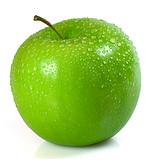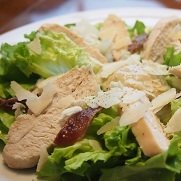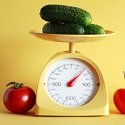Lose Weight
![]() Calories in Food
Calories in Food
![]() Calories in Nuts
Calories in Nuts
![]() Calories in Pistachio Nuts
Calories in Pistachio Nuts
Calories in Pistachios and
Nutrition Facts
How many calories in Pistachios? See below, the Pistachio calories for the different serving sizes. We provide you with Pistachio nutrition facts and the health benefits of Pistachios to help you lose weight and eat a healthy diet.
Pistachios are high in nutrients and packed with vitamins and minerals, and also make a perfect healthy snack - therefore they should be included in your diet. If you are trying to boost your fiber intake, Pistachios are an excellent source. Also, they are a good source of monounsaturated and polyunsaturated fat, good fats that reduce blood cholesterol levels and lower risk of hard disease.
Pistachios are full of antioxidants which repair cell damage caused by the oxidative stress, rich in phytosterols (plant sterols) which have been found to be beneficial for cholesterol reduction. Pistachios are an excellent source of minerals such as calcium, potassium, phosphorus, magnesium; and vitamins: folate (folic acid), beta carotene, vitamin A, lutein and zeaxanthin (which are proven to reduce the risk of developing macular degeneration).
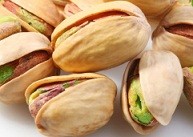
It is considered that if you eat a portion of nuts (30 grams) about twice a week, it was reported in a journal called "Obesity", that you are less likely to gain weight than those who do not eat nuts.
Compare calories in Pistachios with the other calories in nuts.
Calories in Pistachio Nuts, Raw *
Refuse: 47% (Shells)Scientific Name: Pistacia vera
| Serving Size | Calories per Serving |
| 100 grams | 562 kcal (2352 kJ) |
| 1 cup, 123 grams | 691 kcal (2893 kJ) |
| 1 oz (49 kernels), 28.35 grams | 159 kcal (667 kJ) |
| 1 kernel, 0.7 grams | 4 kcal (16 kJ) |
* Unroasted.
Nuts, Pistachio Nuts, Dry Roasted
Refuse: 47% (Shells)| Serving Size | Calories per Serving |
| 100 grams | 567 kcal (2374 kJ) |
| 1 cup, 123 grams | 697 kcal (2920 kJ) |
| 1 oz (49 kernels), 28.35 grams | 161 kcal (673 kJ) |
| 1 kernel, 0.7 grams | 4 kcal (17 kJ) |
Pistachio Nuts Nutrition Facts
| Nutritional value per 100 g (3.5 oz) | |
|---|---|
| Proximates: | |
| Water | 1.85 g |
| Energy | 2374 kJ (576 kcal) |
| Protein | 20.95 g |
| Carbohydrates | 29.38 g |
| Sugars | 7.74 g |
| Total Fat: | 44.82 g |
| saturated fat | 5.456 g |
| monounsaturated fat | 23.676 g |
| polyunsaturated fat | 13.448 g |
| Cholesterol | 0 mg |
| Fiber | 9.9 g |
| Minerals: | |
| Calcium, Ca | 107 mg (11 %) |
| Iron, Fe | 4.03 mg (22 %) |
| Magnesium, Mg | 109 mg (27 %) |
| Phosphorus, P | 469 mg (47 %) |
| Potassium, K | 1007 mg (21 %) |
| Sodium, Na | 6 mg (0.2 %) |
| Zinc, Zn | 2.34 mg (16 %) |
| Copper, Cu | 1.293 mg (65 %) |
| Manganese, Mn | 1.243 mg (62 %) |
| Selenium, Se | 10 mcg (14 %) |
| Vitamins: | |
| Vitamin C | 3.0 mg (5 %) |
| Thiamine (Vit. B1) | 0.695 mg (46 %) |
| Riboflavin (Vit. B2) | 0.234 mg (14 %) |
| Niacin (Vit. B3) | 1.373 mg (7 %) |
| Pantothenic acid (B5) | 0.513 mg (5 %) |
| Vitamin B6 | 1.122 mg (56 %) |
| Folate (Vit. B9) | 51 mcg (13 %) |
| Vitamin B12 | 0.0 mcg (0 %) |
| Vitamin A | 259 IU (5 %) |
| Vitamin E | 2.42 mg (12 %) |
| Vitamin D | 0 IU (0 %) |
| Vitamin K | 13.2 mcg (17 %) |
| Percentages are relative to US Recommended Daily Intake (RDI) for adults. | |
Author: Lana Soko
You Might Also Like:
Like This Page?
|
Share This Page:
|
Search Our Site:

Free E-Book:
We Recommend:
Looking to get your body into great shape? Get the very best results for your efforts and money! Save your valuable time from surfing the internet. These are theBestselling Weight Loss Programs
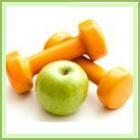
Programs that work and have thousands of satisfied customers worldwide!

 |
